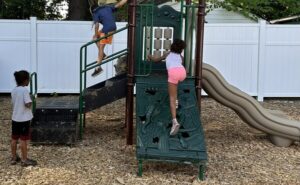
We generally associate October with frights and spooks and things that go bump in the night.
But, for a child, the real challenges of homelessness can be a far more frightening reality than a few Halloween tricks.
Children are far more impressionable and are more likely to experience anxiety if they and their families become homeless. Homelessness disrupts virtually every aspect of family life and can interfere with a child’s development, educational opportunities and health.
Developmental Delays
Young children can experience significant developmental delays as a result of homelessness because the stress can disrupt the brain’s critical early development. Research indicates that infants and children who experience homelessness for more than six months are at a greater risk for these delays than other children.
The most common delays are with speech, hand-eye coordination and emotional development. Smaller children can even regress in their toilet training.
These children cry more often and will overreact to small issues.
Educational Delays
Homeless children are also more likely than their peers to have more difficulty with their academic performance. Children without homes face obstacles that hinder their access to education, such as a lack of transportation to and from school, frequent school changes and the loss of school records.
It can also be difficult for homeless children to concentrate in school because they are worried about where they are going to sleep and what they are going to eat. They also don’t have a safe and quiet place to do their homework.
In addition to this type of emotional stress, many homeless children are more likely to develop learning disabilities but are less likely to receive treatment for these disabilities.
Health Issues
Children who face homelessness also face more health problems than most children. Not only are they more likely to get ear infections, asthma and stomach problems caused by exposure and a lack of properly stored food, they are also more likely to experience depression and aggression.
Imagine how bad you feel just from getting a cold or the flu. Now imagine getting a cold but having no way to rest properly, get the proper nutrition, or stay warm.
And expectant mothers are more likely to experience adversities that can cause premature birth or low birth rates.
That’s why at TORCH, our first goal is that “no child sleeps outside.” It’s our vision that children should never experience homelessness or know that they were homeless in the first place. Through our temporary housing facilities at Agape House and Bookhart Village, we can house families in single-family units in apartment-style living instead of congregate housing or shelters.
If you know of a family who is experiencing homelessness or if your family is homeless in Anderson County, contact TORCH today at (865) 318-4788. Our rapid rehousing program can assist you with shelter, and our Gathering Assistance to Provide Service (GAPS) program can put you in touch with case workers and managers of other programs to help you and your family progress toward self-sufficiency.
